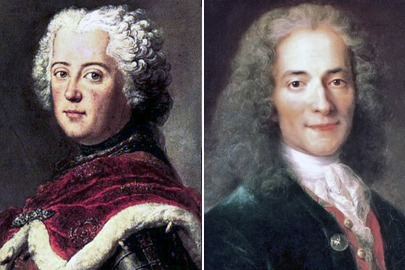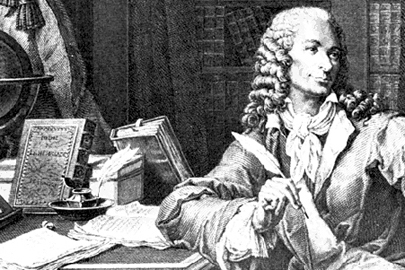'Voltaire and Frederick' looks at lives in letters
The French philosopher and the Prussian ruler were longtime pen pals
 Frederick by Antoine Pesne, Voltaire by Catherine Lusurier after Nicolas de Largillière's painting
Frederick by Antoine Pesne, Voltaire by Catherine Lusurier after Nicolas de Largillière's paintingFrederick, left, and Voltaire
 Engraving by Pierre Charles Baquoy.
Engraving by Pierre Charles Baquoy.Voltaire at Frederick the Great's Sanssouci.
American Repertory Theater and Actors' Shakespeare Project founding members Thomas Derrah and John Kuntz are starring in “Voltaire and Frederick: A Life in Letters,” a new play commissioned by the Goethe-Institut Boston in partnership with the Consulat Général de France.
The work had its world premiere recently at the Goethe-Institut and will be repeated at Brandeis Monday, Oct. 22, at 7:30 p.m. in the Mandel Humanities Center Atrium. It is sponsored by the Center for German and European Studies. Admission is free.
The play was commissioned in honor of Frederick the Great’s 300th birthday. It is an overview of the pen-pal friendship between these two great thinkers that spanned almost half a century. The play is made up of selected letter exchanges between the great French-European philosopher and the royal prince, later king, of Prussia, beginning when the latter was a mere 24 years old and the former 42, and ending with the eulogy Frederick II wrote when Voltaire died in 1778.
Their intensive correspondence on everything from questions of torture and human rights to good and bad governance, from handling a global financial crisis to judging whether a war is justified, all in the context of a newly enlightened Europe, is surprisingly modern and much of it rings true in today’s politicized times. Voltaire and Frederick’s tempestuous and unfolding love-hate relationship gives insight not only into 18th-century history but also into more general ideas about love, desire, desperation, death and God.
Voltaire is played by Thomas Derrah, a founding member of the American Repertory Theater who has and has acted in 119 of its productions. His numerous awards include the Elliot Norton Prize for Sustained Excellence and IRNE Awards for Best Actor. He has appeared in many films and television productions including “Mystic River” and “The Pink Panther II.” He is on the faculty of the A.R.T. Institute, teaches acting at Harvard University and Emerson College, and is a graduate of the Yale School of Drama.
John Kuntz, who plays Frederick, is a founding company member of the Actors' Shakespeare Project and has acted with many theater companies including Lyric Stage, Huntington Theatre Company and Commonwealth Shakespeare. He is the author of 14 full-length plays for which he has received numerous awards. He received both an Elliot Norton Award and New York International Fringe Festival Award for his solo show “Starfuckers,” and his plays “Sing Me To Sleep” and “Freaks!” both received Elliot Norton Awards for "Outstanding Fringe Production." His newest solo show, “The Salt Girl,” received the 2010 Elliot Norton Award for Best New Play. He teaches at Suffolk University and is on the faculty of The Boston Conservatory.
The show is directed and produced by Guy Ben-Aharon, the producing artistic director and founder of Israeli Stage, an initiative to bring Israeli theatre to American audiences. He is also the sole proprietor and president of GBA Productions LLC, a commercial entity that is dedicated to producing theatrical ventures. Aharon has directed and produced seven plays for Israeli Stage, featuring multiple IRNE and Elliot Norton Award winning actors. He is a graduate of Emerson College where he was the Waldman Award recipient for an exceptional promise for a career in theater.
German Stage is an initiative supported by the Goethe-Institut Boston to explore narrative in German culture and society through theater. In addition to presenting Stage Readings of contemporary German plays in the presence of the invited playwrights, German Stage develops staged works that address current and historical topics in Germany. The series was developed in close collaboration with Ben-Aharon.
Categories: Arts, Humanities and Social Sciences





